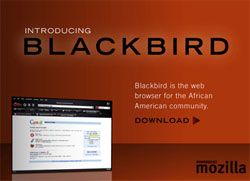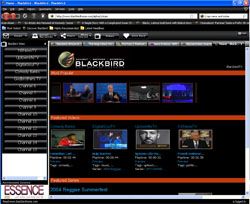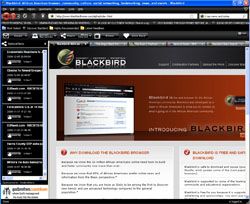BlackBird, the Browser for Black People

BlackBird is a browser built on Mozilla Firefox aimed at African-Americans. It features Black Search, Black News Ticker/Scroll, Black Video and Black Bookmarks. There are buttons on the toolbar for sharing web pages, going directly to your social networks (Facebook, MySpace and Ning only--no Hi5...), and giving back to the Black community by donating to partnered non-profit organizations.
The browser looks like Firefox with a custom theme and some fancy add-ons, but it has been rebranded BlackBird. It's unclear right now what version of Firefox it's built on top of, but it looks to be some version of 3.x. Because BlackBird is its own entity, updates to Firefox won't immediately apply -- and that's just the start of its problems.
Putting aside the niche targeting, as a browser I don't find it especially compelling. Most of the services -- including the unnecessary ticker scroll, one click access to social networks, link sharing, sidebar email -- are available as mainstream add-ons for Firefox. They won't necessarily be targeted at Black people, though. After examining all the features, I came to understand that the browser is not the point, it's just the beginning.

Click on the Video, Share, or Give Back buttons and you'll be taken to BlackBird branded sites. Video consists of several channels that seem to constitute an African-American Hulu/YouTube. Share leads to social bookmarking that loads in the sidebar -- users can vote a story up and discuss the links. The news items that scroll up top come from the bbnewsfeed. There's even Black Search, which is just Google custom search with a logo in the corner.
What BlackBird appears to want is to be the center of your online life, much the way Google does. By "you" I mean Black people, obviously. By wrapping users in a content blanket that privileges the interests of the audience, the folks behind the browser hope to capture and keep its audience. After all, you can access the Web just the same, but the stuff within easy reach and the scrolls snatching your attention are targeted at you.
And we all know what happens when people find a way to target you: advertising.

I first spotted ads at the bottom of the social bookmarking sidebar, then again on the video sidebar. I suspect the video pages will have some soon. There's plenty more potential in the browser itself and on the sites it guides you to. And that's probably the real reason behind the BlackBird effort, not making the Web experience better for African-Americans.
Stay in the know with Laptop Mag
Get our in-depth reviews, helpful tips, great deals, and the biggest news stories delivered to your inbox.
Yes, I am a cynic, because I don't see how the browser makes the Internet experience better. It makes it somewhat easier, especially for those who are less Web-savvy, just as AOL once did (and still tries to do). And consolidating news, information, and entertainment produced for and concerning Black people isn't a bad idea. After all, the best way to thrive online is to make a community. And even though not all people who identify as Black have the same interests, there is a sense of "we belong together", even if that sense is often pushed on us from outside. Still, there's always a money angle.
Add to that my inability to find out much about the people behind BlackBird. The website says: "Blackbird is operated by 40A, Inc., a company founded by three African American entrepreneurs, Arnold Brown II, Frank Washington, and H. Edward Young, Jr." However, a search for 40A, Inc. turns up only one hit, and that's on the TechCrunch wiki, which got its information from the website. Attempts to email the contacts listed on the About page resulted in delivery failures. And a (cursory) search on the names mentioned revealed little except that H. Edward Young, Jr. is one of the publishers of Source magazine and is a lawyer.
I'm as willing as the next early adopter to give new enterprises a go. I just don't have a good feeling about this one. If BlackBird had put out its social networking or portal angle out first, then made the browser an adjunct to that, I might not feel the same. The way this browser is marketed, the language, and the very idea that Black people somehow need a different piece of software to deal with the internet all rubs me the wrong way.
Plus, BlackBird made itself my default browser even though I told it not to. That may seem like a small thing, but it isn't. When software does things you don't want or that you specifically ask it not to do, warning sirens should go off.
(Thanks Vylar!)
Via: Tech Crunch
Update: It's been pointed out to us in the comments here and elsewhere that the term Blackbird was slang for slaves and slave ships (possibly during the era when importing slaves was first outlawed in the US) and that Blackbirding is a common term in Australia and New Zealand that "refers to the recruitment of [indigenous] people through trickery and kidnappings to work on plantations." BlackBird's creators probably did not intend to evoke any of these images, but it does seem ironic and more than a little clueless considering that this product is aimed at African-Americans.
